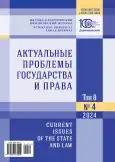Requirements for military goods under the legislation of the Russian Empire of the 19th century
- Authors: KOVALEVA N.V.1, ZOZULYA A.A.2
-
Affiliations:
- Management Academy of the Ministry of the Interior of the Russian Federation
- Saint-Petersburg University State Fire Service of the Ministry of the Russian Federation for Civil Defense, Emergencies and Elimination of Consequences of Natural Disasters named after the Hero of the Russian Federation, Army General E.N. Zinichev
- Issue: Vol 8, No 4 (2024)
- Pages: 475-482
- Section: General Theory and History of Law and the State
- URL: https://journal-vniispk.ru/2587-9340/article/view/303448
- ID: 303448
Cite item
Abstract
Ensuring the state’s security is objectively related to providing its force structures with weapons and equipment. The intensive development of warfare methods and means imposes new requirements on the characteristics of military goods, which necessitates the improvement of technical and legal regulation in this area. These factors focus on the study of the existing experience in the legal regulation of the quality of defense products. The study aims to test the hypothesis that the establishment of requirements for military goods at the legislative level was mainly through technical-legal norms. In the course of the study, systemic, structural-functional, historical-legal and formal-legal methods are applied. The legislation of the Russian Empire of the first half of the 19th century in force in this area is analyzed. The unsystematic and fragmentation of certain statutory instruments containing regulatory requirements for military goods is revealed. It is established that the legislator paid special attention to detailing the requirements for the detection of product defects during their acceptance by the state customer. It is concluded that various methods have been used to formulate technical and legal norms.
About the authors
Natalia V. KOVALEVA
Management Academy of the Ministry of the Interior of the Russian Federation
Author for correspondence.
Email: doktor.kovaleva.nv@yandex.ru
ORCID iD: 0000-0003-2982-871X
Dr. Sci. (Law), Associate Professor, Professor of Public Law and Legal Support of Management Department, The State University of Management
Russian Federation, 8 Zoi and Alexander Kosmodemyanskikh St., Moscow, 125993, Russian FederationAlexandr A. ZOZULYA
Saint-Petersburg University State Fire Service of the Ministry of the Russian Federation for Civil Defense, Emergencies and Elimination of Consequences of Natural Disasters named after the Hero of the Russian Federation, Army General E.N. Zinichev
Email: alezozulya@mail.ru
ORCID iD: 0000-0002-6571-136X
Cand. Sci. (Law), Associate Professor of Theory and History of State and Law Faculty
149 Moskovskiy Ave., St. Petersburg, 196105, Russian FederationReferences
- Serov I.B. (2018). Sovremennye mezhdunarodno-pravovye voprosy mezhdunarodnogo oborota oruzhiya. Cand. Sci. (Law) diss. Moscow, 170 p. (In Russ.) https://elibrary.ru/ubbxha
- Bondurovskii V.V., Pospelov S.V. (2024). The activities of the CSTO parliamentary assembly in the context of the transformation of challenges and threats to security. Pravo. Bezopasnost’. Chrezvychainye situatsii = Law. Safety. Emergency Situations, no. 2 (63), pp. 14-26. (In Russ.) https://doi.org/10.61260/2074-1626-2024-2-14-26, https://elibrary.ru/maqbzm
- Kovaleva N.V. (2021). Industrial legislation of the Russian empire of the 19th century. Pravo i gosudarstvo: te-oriya i praktika = Law and State: The Theory and Practice, no. 8 (200), pp. 44-46. (In Russ.) https://doi.org/10.47643/1815-1337_2021_8_44, https://elibrary.ru/gthdzc
- Leshchenko Yu.N. (2009). Organizatsiya vooruzheniya russkoi armii strelkovym oruzhiem (konets XIX – nachalo XX v.). Cand. Sci. (History) diss. abstr. Moscow, 34 p. (In Russ.) https://elibrary.ru/znxhqf
- Kovaleva N.V. (2011). Technical legal regulation of dangerous manufacturing in the Russian empire (19th – early 20th century). Zhurnal rossiiskogo prava = Journal of Russian Law, no. 3 (171), pp. 94-102. (In Russ.) https://elibrary.ru/ndoqif
- Kovaleva N.V. (2011). Organisation, location and functioning of industrial warehouses according to the law of Russian Empire of 19th– the beginning of 20th centuries.. Istoriya gosudarstva i prava = History of State and Law, no. 3, pp. 30-34. (In Russ.) https://elibrary.ru/ntlkjr
- Bakshaev A.A. (2020). The development of regulatory framework for military production by the state mining plants of the Urals at the second quarter of the 19th century. Istoriya i sovremennoe mirovozzrenie = History and Modern Perspectives, vol. 2, no. 3, pp. 79-85. (In Russ.) https://doi.org/10.33693/2658-4654/-2020-2-3-79-85, https://elibrary.ru/bnbmje
- Sergievskii I.A., Soklakov A.Yu. (2019). “Keeping a close watch on accepting ammunition and guns properly”. Establishment of military acceptance bodies in Russia in the first third of the 19th century. Voenno-istoricheskii zhurnal = Military History Magazine, no. 12, pp. 17-24. (In Russ.) https://elibrary.ru/jsjnyi
- Kurakin A.B. (1808). Highly Confirmed Reports on Providing the Army with Cloth, on the Multiplication and Strengthening of the Manufacture of Cloth in the State and on the Formation of the Main Board of Manufacto-ries. St. Petersburg, Meditsinskaya tipografiya Publ., 158 p. (In Russ.)
- Svininykh E.A. (2013). Legal regulation of state procurement of armament for the Russian Army’s needs in pre-revolutionary Russia. Voennoe pravo = Military Law, no. 3, pp. 130-162. (In Russ.) https://elibrary.ru/tbinkn
- Sergievskii I.A. (2018). The origin of the national institute of military acceptance at the Russian mines in the early 19th century. Vestnik Permskogo natsional’nogo issledovatel’skogo politekhnicheskogo universiteta. Kul’tura, istoriya, filosofiya, pravo = Bulletin of PNRPU. Culture. History. Philosophy. Law, no. 3, pp. 128-138. (In Russ.) https://doi.org/10.15593/perm.kipf/2018.3.12, https://elibrary.ru/oozlrm
- Kovaleva N.V. (2016). Nature and functions of technical-legal norms. Gosudarstvo i pravo = State and Law, no. 11, pp. 5-12. (In Russ.) https://elibrary.ru/xafmmr
Supplementary files








